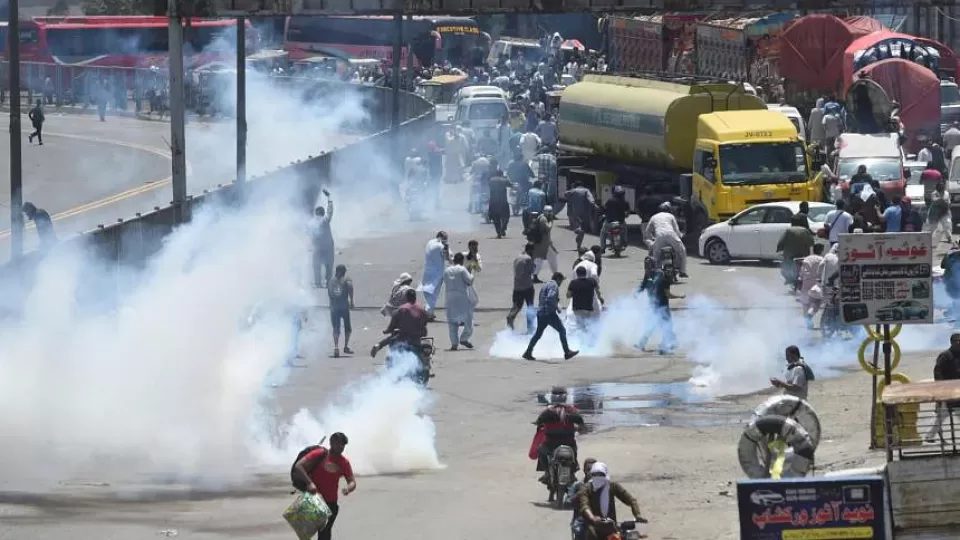June 27, 2022
ISLAMABAD – SHOULD there be outrage that in recent weeks a number of Pakistani citizens have been taken away forcibly and without legal authority; mostly by plainclothesmen — operating with the impunity that is the hallmark of entitled security services agents — and, in rare cases, by uniformed personnel?
Or should we be grateful for small mercies, such as the fact that of those taken away, many have been safely returned to their families and friends, and that they bore no telltale signs of the third-degree methods the state is known to routinely employ to extract information, even confessions?
Well, I can’t decide. Can you? A freelance journalist who tweets about the issues confronting his community is picked up allegedly by the paramilitary Rangers from his home at four in the morning. Those who take him away show no warrants and don’t even tell his shaken wife where they are taking him.
I know from personal experience, and from talking to many, many victims, that having armed men violate the sanctity of your home can cause acute trauma and leave scars that may never heal in the form of post-traumatic stress. And we aren’t even referring to long detentions and/or torture here.
‘We took him away, we released him. Live with it.’ This was the attitude.
So, when the freelance journalist, or if you prefer to call him a partisan social media activist, returns home late in the evening, what should he, his traumatised wife, and small children feel? Relief, gratitude or outrage? That we need to ask these questions underlines the tragedy of our times.
The kidnappers, and I say this because as these lines are being written many hours later, there is still no evidence of the arrest being legal, have the gall to issue a statement literally accusing the victim of having ties with, and ‘receiving funds’ from a ‘terror group’.
They thus justify the ordeal inflicted on him and the family by saying he was released after he was told to cooperate with the investigation. Nowhere do they mention the law under which the arrest was effected, and hence there is no question of bail as he was never presented before a court.
We took him away, we released him. Live with it. This was the attitude. I suspect his only crime was tweeting about his community’s issues and mentioning the popularity of a ‘banned’ leader in the wake of a recent by-election in Karachi. We can’t even tolerate our ‘lesser’ citizens exercising their right to free speech.
A number of Baloch students, many away from their homes and home province in the quest of a halfway decent education, have met the same fate: being picked up and disappeared and then some days later reappearing. Those are the lucky ones, as innumerable Baloch youth have disappeared without a trace.
There was a time, perhaps to send out a warning to those agitating for their rights not to cross some zigzag line arbitrarily drawn by the security state, that the tortured bodies of the kidnapped victims were found dumped with even their names, etc. pinned to their bullet-riddled chests.
Then, I guess, things got a little too embarrassing. So, now the disappeared belong to two main categories. The first who are picked up, are threatened to ‘mend’ their ways, and then set free, and then there are those who remain missing without a trace, a lifelong anguish for their families who are condemned to a life sentence of not knowing.
Pakistanis often discuss and lament how intolerant society seems to have become — where there isn’t room for any civil disagreement or difference of opinion. Why the surprise? The riyasat (state) is likened to the maa (mother) and intolerance is acquired in those loving arms, in the cradle.
The Pakistani state has always had brutal tendencies, has always believed in overkill; it has always been intolerant of dissent and diversity of approach in dealing with issues; and, as far back as I can remember, has preferred a unilateral sledgehammer approach to engaging with dissidents.
But the US-led ‘war on terror’ gave the authorities carte blanche to do as they pleased as they set upon religiously motivated militants who in the not-too distant past were their very own surrogates, nurtured and used for policy objectives. The prying eyes, possibly, of the Western media turned away for a bit.
Since then, democracy, or whatever passes for it in our case, has been restored and we have had three civilian governments and six prime ministers, three army chiefs and our very own war on terror in which far too many of our young soldiers, officers and men, and civilians have perished.
If that pain of the loss of tens of thousands of our beloved civilians and soldiers alike has not made us a bit more introspective, a bit more humane, and even if after such a monumental blood sacrifice we still can’t value life and liberty as the greatest gift to humankind, then what else will teach us?
Equally alarming is the state’s propensity to hand out the harshest of treatments to citizens on such basis that they feel discriminated against and see themselves as ‘lesser citizens’. Can there be a greater travesty in a country, a federation that ought to find strength in and celebrate its ethnic diversity?
The heavens would not have fallen had an elected public representative from a volatile region — who lost a dozen and half close family members to terrorists and had good cause— been extended the same courtesy and latitude shown to those whose loss of office makes them spare no invective while attacking our defenders.
If governments, calling themselves elected and constitutional, are helpless in ensuring the fundamental rights of even elected parliamentarians, where else can we look? Perhaps towards our superior judiciary, which may find time from its preoccupation with the moral shortcomings of elected politicians, to focus on this pressing issue.


